Babies or toddlers can overeat, but it is preventable! As parents, it is our job to nurture our children’s natural instinct to eat intuitively. Here are helpful tips to ensure that you’re not over-feeding your baby or toddler and instead raising a mindful eater for life.

Want to read this post in a visual way? Check out my Google web stories on Can Babies or Toddlers Overeat?
If you’ve ever wondered whether it’s possible for your baby or toddler to overeat, you’re not alone. As a registered dietitian and nutritionist with a specialty in pregnancy, babies and kids, I’m asked this question all the time.
Need personalized nutrition support?
Book an appointment with one of our pediatric dietitians today!
In this post, we discuss:
- Common strategies that lead to overeating in babies and toddlers
- Can my baby overeat?
- Can breastfed babies overeat?
- How long should it take to breastfeed your baby?
- Cluster-feeding
- Can bottle-fed babies overeat?
- Is it okay to feed my baby to soothe?
- Can my toddler overeat?
- 5 tips if you think your toddler eats too fast or too much
Although it certainly is possible for a baby or toddler to overeat, it’s 100% something that as parents we can prevent.
See, it’s our job to nurture our children’s natural instinct to eat intuitively. That’s right: our kids are born intuitive eaters! What that means is that, given the chance, babies and toddlers will almost always eat according to natural physical hunger and fullness cues.
Common strategies that lead to overeating in children
Unfortunately, it’s really easy for well-meaning parents to interfere with a child’s intuitive eating. How? Because as parents we feel as though it’s our job to make sure our child eats a certain amount.
Enter common strategies that lead to over-feeding, such as:
- the 2-bite rule
- the airplane trick (vrrrooom here comes the plane!)
- pushing a bottle into baby’s mouth to finish it the last drop
Sound familiar?
These common strategies can lead to over-feeding and can teach a child to not trust their own bodies. They can also potentially create bigger issues down the road. Now, if you’re thinking to yourself “darn… I’ve done those things”, don’t worry, most parents have—you’re not alone.
You also haven’t doomed your child to a lifetime of over-eating. So breathe a sigh of relief knowing that there are plenty of small, simple ways to shift feeding dynamics in your home to nurture your child’s ability to eat the right amount for their body.
Let’s dive in!
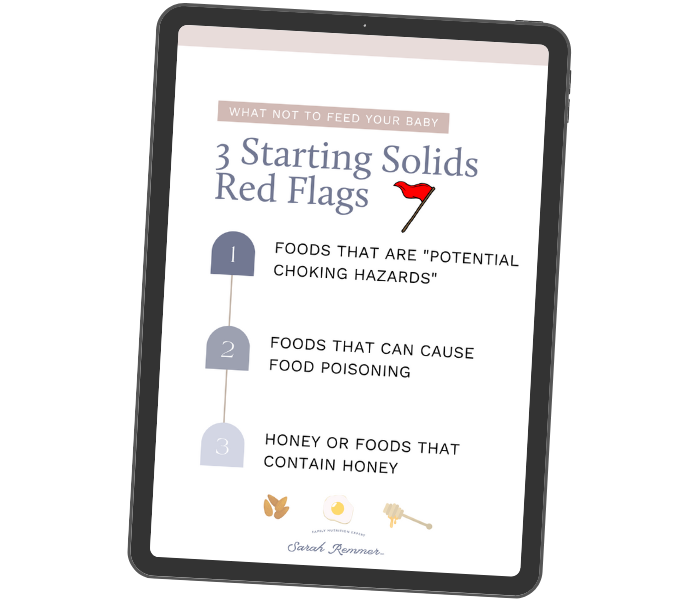
Starting solids? Don’t panic.
Starting solids is an exciting milestone in your baby’s life, but it can also be confusing, especially when you’re overloaded with conflicting information on how and when to do it. Download your free guide to starting solids and clear the confusion!
Can babies overeat?
This is a common question for both breastfed and bottle-fed babies. After all, babies don’t come with a manual that offers guidelines on exactly how much to feed. That’s why it’s SO important to learn about and practice responsive feeding.
Responsive feeding is a way of describing the two-way feeding relationship between parent and child, where parents pay close attention to their child’s hunger and fullness cues (both verbal or nonverbal), and then respond accordingly.
For young babies, who are feeding on demand, this means responding to cues that tell you they want to start, slow down or stop feeding.

For older babies and toddlers, who have a more established routine of solid food meals and snacks, this means responding to signs of hunger or fullness, like offering more when they cue for more, and slowing down or stopping when they indicate fullness.
Paying attention to hunger cues will help to avoid overfeeding (and underfeeding) and may help to positively influence a child’s ability to self-regulate their food intake long-term.
Can breastfed babies overeat?
For moms who breastfeed, it’s all about supply and demand. To establish a good milk supply and flow, it’s suggested that babies are fed on demand. This is called baby-led weaning, and it helps you to recognize and respond to your baby’s appetite, hunger, and fullness cues, and nurtures your baby’s natural ability to eat mindfully.
Because your baby can’t tell you when they’re hungry, it’s important to be responsive to their hunger cues, such as:
- sucking on their hand or arm
- smacking their lips together
- becoming restless
- “rooting” (moving their mouth, turning their head toward your chest)

If you’re able to respond to these initial signs of hunger (and not wait until your baby is so hungry that they’re crying or really upset) your baby will happily start sucking and drink what they need, and they’ll stop when they’re comfortably full. Your breastfed baby will let you know when they’ve had enough or if they want more.
In most cases, your baby will consume most of what’s available during the first 10 minutes of feeding on each breast, then might move away or doze off. When your baby is done, they may turn their head or give other signs of being done.
How long should it take to breastfeed a baby?
Most feeds will be between 10 and 15 minutes, but it’s normal for babies to feed for as little as 1 minute or as much as 45 to 50 minutes. Let their hunger dictate. When it comes to how many times to feed, again, it should be on-demand when baby is showing signs of hunger (see below for a list of cues). For newborns it’s usually around 8 to 12 times in a 24-hour period, or roughly every 2 to 3 hours. More or less.
A list of hunger and fullness cues from baby
Hunger cues:
- Rooting (when baby opens their mouth, turns toward your chest)
- Sucking on their hand or arm
- Smacking their lips together
- Getting restless
- Crying
Fullness cues:
- Turning their head away
- Closing their lips
- Slowing down or stopping sucking
- Falling asleep
- Becoming distracted and looking away
- Playing with (or biting) the nipple
Cluster-feeding
“Cluster-feeding” is when babies feed very frequently for a period of hours or even days, without warning or a clear reason. Usually it’s because they’re going through a heavy growth stage. This is when you really need to trust your baby and follow their cues. They know how much they need! If you follow their cues, you will not be overfeeding them. Oh, and stock up on patience, humor, and any help you can get!
What about bottle fed babies?
I strongly believe in baby-led feeding, even with bottle-fed babies.
If you’re able to pay attention to your baby’s cues, feed responsively, and resist the urge to stick to a schedule when it comes to feeding, you can rest easy knowing that your baby is getting the perfect amount for proper growth and development.
Formula-fed babies, in the first weeks of life, will tend to eat a little less frequently than breastfed babies—about every 3 to 4 hours simply because formula is digested more slowly than breastmilk. Of course, this can vary from day to day, and from baby to baby. Watch for your baby’s hunger cues, as mentioned above, and try not to use the clock as a guide or stick to a strict schedule.

How do I know if my bottle-fed baby has had enough?
Remember, babies are very intuitive and will let you know when they’re full or when they want more. Don’t force it.
Instead of shoving the bottle or breast into your baby’s mouth, wait for their cue to feed more. And if there’s no cue, don’t bring the bottle or breast to their mouth again. If your baby hasn’t drank the same amount as they usually do, or hasn’t drained the bottle, that’s ok! They know best. On average, by the end of the first month, your baby should be drinking at least 4 ounces of formula per feed. By 6 months, they’ll likely be consuming about 6 to 8 ounces per feed. But again, this can vary a lot.
If you’re not convinced that your baby is getting enough, use their wet diapers as a guide. Your baby will likely have about 6 wet diapers a day in the first month and about 3 to 4 bowel movements per day. Your baby will also seem satisfied and not show signs of hunger for about 2 to 3 hours after each feed if they are getting enough.

Is it okay to feed my baby to soothe? Can this lead to over-feeding?
Sometimes it can be hard to decipher whether your baby is hungry or needs soothing (right?!) because babies suck when they need soothing.
As you get to know your baby more, you’ll be able to distinguish between their hunger cues and their need for soothing. It’s hard for parents to know whether to let baby suck on the breast or bottle versus a pacifier or finger. Babies suck for comfort regardless, and sometimes for sleep too so this creates a bit of a dilemma. There are many differing opinions when it comes to comfort feeding. Some experts believe that nursing babies to sleep and for comfort is perfectly normal and beneficial, while others believe that nursing or bottle-feeding should be reserved only for nourishment and could possible lead to over-feeding.
I wish I had a more clear-cut answer here. It’s really a personal choice!
Can Toddlers Overeat?
If you have a toddler who is passionate about food and can’t get it in fast enough, you’re not alone (I have a child like this!). Parents either celebrate their food-loving kids or worry that their toddler overeats. But it’s important not to stress about it. In fact, projecting stress, pressure, or worry will make it worse. Instead, focus on your role as the “feeder” and trust that your toddler will do their job as the “eater.”
Some kids just love food or need more than others. Often there’s no obvious reason for this, and it can fluctuate depending on whether they’re going through a growth spurt, what their activity level is, what they ate the day before, and so many other factors.
Parent feeding jobs:

When you do your job feeding, your children will do their job eating.
- Provide regular meals and snacks
- Choose and prepare the food
- Be considerate about foods served, without catering to likes and dislikes
- Set mealtime boundaries
- Make eating times pleasant and positive
- Show by example how to behave at mealtime
- Let children grow into the bodies that are right for them
Child eating jobs:
- Decide if they will eat
- Eat the amount they need
- Learn to eat the food their parents eat and serve
- Learn to behave well at mealtime
- Grow predictably
5 tips if you think your toddler eats too fast or too much
Make sure that you’re following the division of responsibility (sDOR)
In the sDOR, parents are responsible for what, where, and when food is served and kids are in charge of if and how much they eat. If toddlers are served balanced, healthy meals and snacks at appropriate intervals, they will eat intuitively and learn to self-regulate their intake. Babies and toddlers RARELY overeat.
Don’t restrict, forbid, or micromanage food intake
If your toddler feels that a desired food is restricted, it will create a desire for more. When available, they may eat more in anticipation of it being restricted afterward. Make sure to offer a variety of nutritious foods (including ones they love) at mealtimes and let your toddler have as much or as little as they’d like.
Serve meals family style so kids get to serve themselves in proportions that feel right to them (yes, even toddlers!).
They’re always able to go back for more.
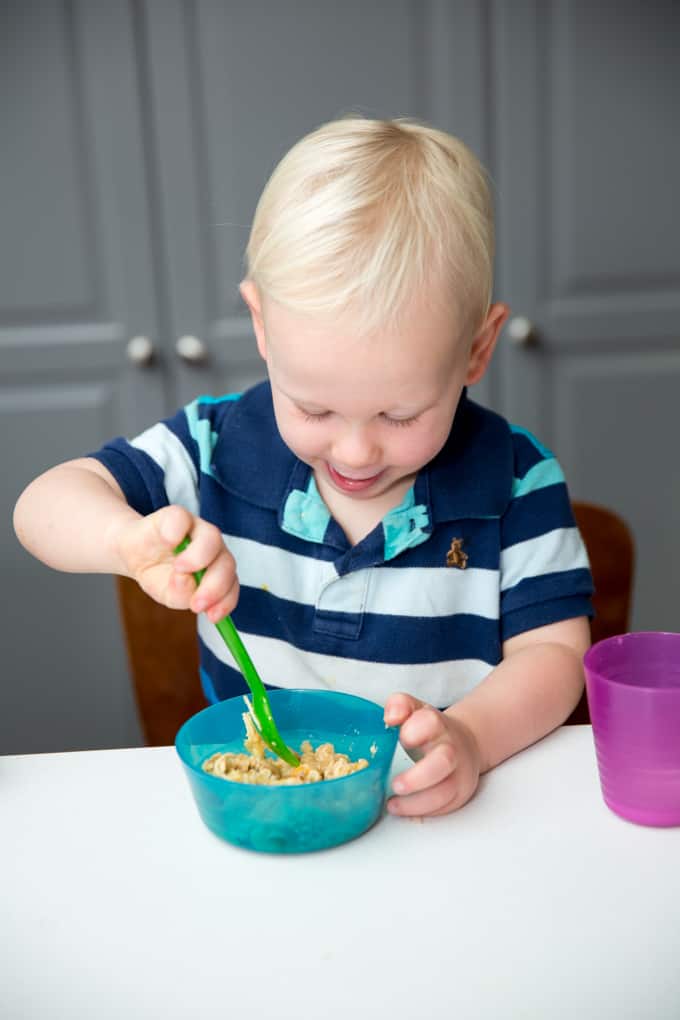
Give your toddler enough time to eat
Toddlers need at least 10 minutes to finish a meal. If they feel rushed, they may eat too fast (and subsequently too much). They should feel relaxed at the table and know that they have enough time to eat comfortably.
Minimize distractions
Screens and toys can impact the speed and amount that your toddler eats at a given time. These distractions can divert your toddler’s attention away from their food and their tummy (internal hunger cues), which discourages mindful or intuitive eating.
Make it a teachable moment
Older toddlers will start to understand an association between a tummy ache and overeating if you can explain it in terms that they’ll understand. At about age 2½ or 3, you can introduce the concept of “eating until your tummy is comfortable” or “listening to your tummy” at mealtimes.
If your toddler overeats and has a tummy ache you can—without judging or shaming—say something like “when we eat too much, our tummy hurts.” And then when you see this happening again in the future, you can remind them of the time that they overate and got a tummy ache.
My son typically eats very fast and out-eats me most days, yet continues to follow his growth curve and remain at a healthy weight. I remember when he was just 3 years old and he scarfed down an entire medium pizza. As shocked and surprised as we were to watch him devour piece after piece, we sat back, didn’t micromanage or judge, and let him eat until he was satisfied. It turned out that he was going through a growth spurt at the time and had been extra-active that week—2 factors that would explain the increased appetite.
Bottom line
Babies and toddlers rarely overeat, and if given the chance, will eat the right amount for their bodies, and growth and development. Remember that this doesn’t always mean that they’ll eat everything on their plate, or finish their bottle. Their appetites and eating can fluctuate greatly day-to-day for many reasons. Sometimes they won’t eat much at all, or sometimes they’ll out-eat you! Focus on your job of feeding, feed responsively and according to your little ones’ cues, and rest easy that they’ll get what they need!
For more information feel free to reach out to the team at The Centre for Family Nutrition. We’re here to help!
Commonly asked Questions: Is my baby or toddler eating too much?
Paying attention to hunger cues will help to avoid overfeeding (and underfeeding) and may help to positively influence a child’s ability to self-regulate their food intake long-term.
It depends. For moms who breastfeed, it’s all about supply and demand. To establish a good milk supply and flow, it’s suggested that babies are fed on demand. This is called infant-led feeding, and it helps you to recognize and respond to your baby’s appetite, hunger, and fullness cues, and nurtures your baby’s natural ability to eat mindfully.
Formula-fed babies, in the first weeks of life, will tend to eat a little less frequently than breastfed babies—about every 3 to 4 hours simply because formula is digested more slowly than breastmilk. Of course, this can vary from day to day, and from baby to baby. Watch for your baby’s hunger cues, and try not to use the clock as a guide or stick to a strict schedule.
Most feeds will be between 10 and 15 minutes, but it’s normal for babies to feed for as little as 1 minute or as much as 45 to 50 minutes. Let their hunger dictate. When it comes to how many times to feed, again, it should be on-demand when baby is showing signs of hunger (see below for a list of cues). For newborns it’s usually around 8 to 12 times in a 24-hour period, or roughly every 2 to 3 hours. More or less.
There are many differing opinions when it comes to comfort feeding. Some experts believe that nursing babies to sleep and for comfort is perfectly normal and beneficial, while others believe that nursing or bottle-feeding should be reserved only for nourishment and could possible lead to over-feeding. It comes down to personal choice.
Likely not. Follow the Division of Responsibility (sDOR) in feeding. In the sDOR, parents are responsible for what, where, and when food is served and kids are in charge of if and how much they eat. If toddlers are served balanced, healthy meals and snacks at appropriate intervals, they will eat intuitively and learn to self-regulate their intake. Babies and toddlers RARELY overeat. Learn more about Division of Responsibility.
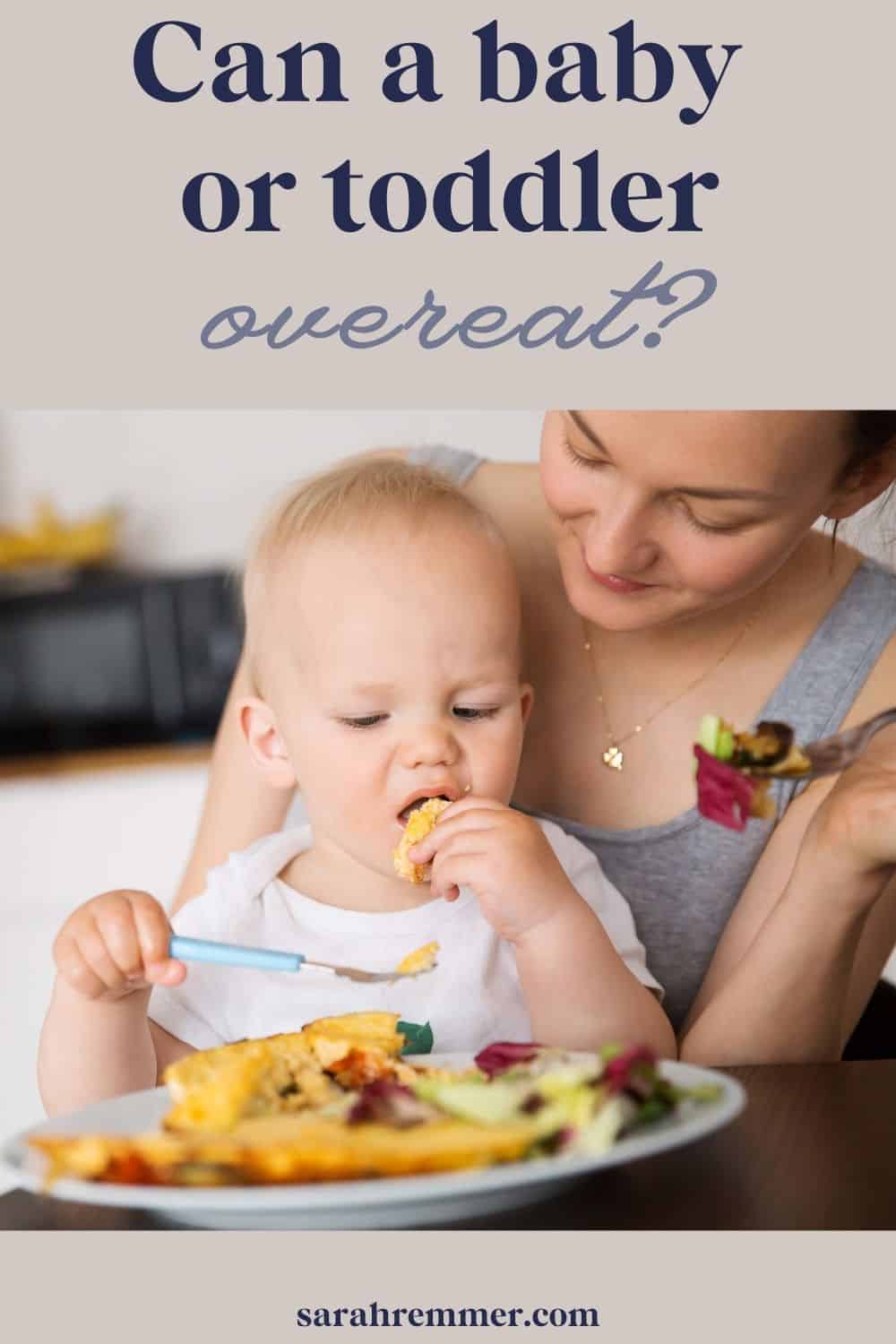
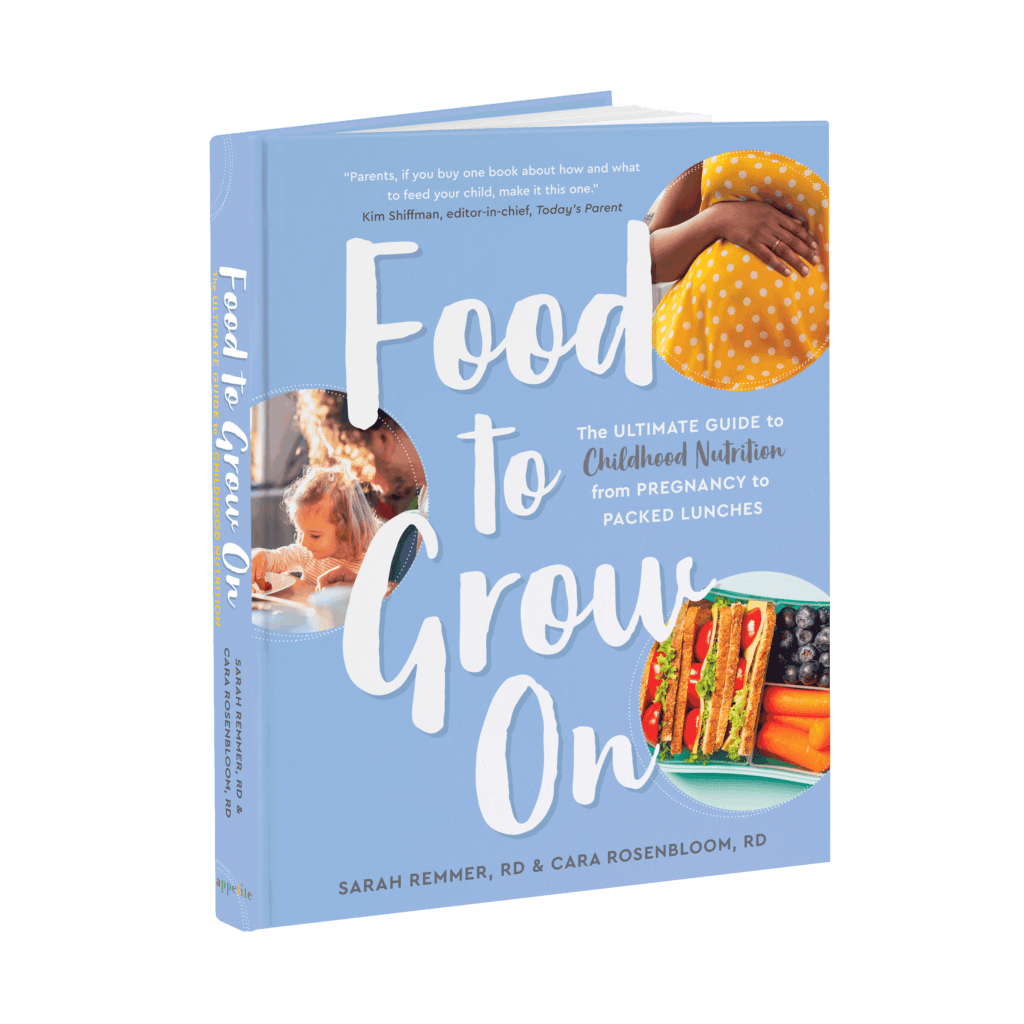
Food to Grow On
Food to Grow On is the definitive guide to childhood nutrition, packed with practical advice to support you through pregnancy, and up until your little one starts school.
Laid out in an easy-to-navigate question and answer style, this book provides practical advice and support from Sarah Remmer and Cara Rosenbloom, two trusted registered dietitians (and moms). Food to Grow On is packed with hard-earned parenting wisdom and the very latest research in pediatric nutrition, so you will feel supported, understood, and ready to help your child thrive.




![[AD] It’s Day 6 of my 15-Minute Supper Series and today we’re putting a delicious twist on a classic BLT to make it nourishing and meal-worthy 🤤
Make sure to comment “Spud” and I’ll send you my top dietitian tips for feeding your family on busy weeknights along with a huge list of meal ideas!
This pasta salad takes no time at all to throw together and has everything you need for a nourishing meal. I always make extra bacon for things like this, but if you don’t have any cooked bacon I find cooking it in the airfryer or stovetop the quickest 🥓
I find that this salad lasts 2-3 days in the fridge without getting too soggy. You can also add in fresh lettuce to crisp it up or add the dressing when you eat it.
I ordered all of my groceries from @spuddelivers, which always saves me time and effort and gives me peace of mind knowing that I’m using high-quality, local and sustainable ingredients. I love that they come straight to my door the day after ordering 🙌🏻
Let’s make it!
Ingredients:
* 10 slices bacon cooked and diced
* 12 ounces pasta cooked and cooled
* 1 cup homemade Ranch dressing
* 1 ½ cup baby tomatoes diced
* ½ avocado diced
* feta
* ⅓ cup red onion diced
* 1 cup romaine lettuce
* fresh parsley for garnish optional
Homemade ranch dressing:
* ¾ cup mayonnaise
* ½ cup sour cream or Greek yogurt
* ½ teaspoon dried chives
* ½ teaspoon dried parsley
* ½ teaspoon dried dill weed
* ¼ teaspoon garlic powder
* ¼ teaspoon onion powder
* Salt and pepper to taste
Make it:
1. Blend all Ranch dressing ingredients together in a small blender (or whisk by hand) and set aside.
2. In a large bowl assemble the pasta, tomatoes, avocado, cheese, red onion, lettuce and bacon.
3. Pour the dressing over and toss to combine.
4. Garnish with parsley and serve.
You are going to LOVE this meal-worthy salad, I promise!
Comment SPUD to receive my top dietitian-approved tips for feeding your family during the week, a long list of ideas, and a curated shopping list with all of the ingredients for this recipe + all of the other ideas that I share in this resource!
#sponsored #spuddelivers #15minutemeals #whatsfordinner #easymealideas #dietitianapproved](https://www.sarahremmer.com/wp-content/uploads/sb-instagram-feed-images/438745920_798281295514125_2547899647147267180_nfull.jpg)


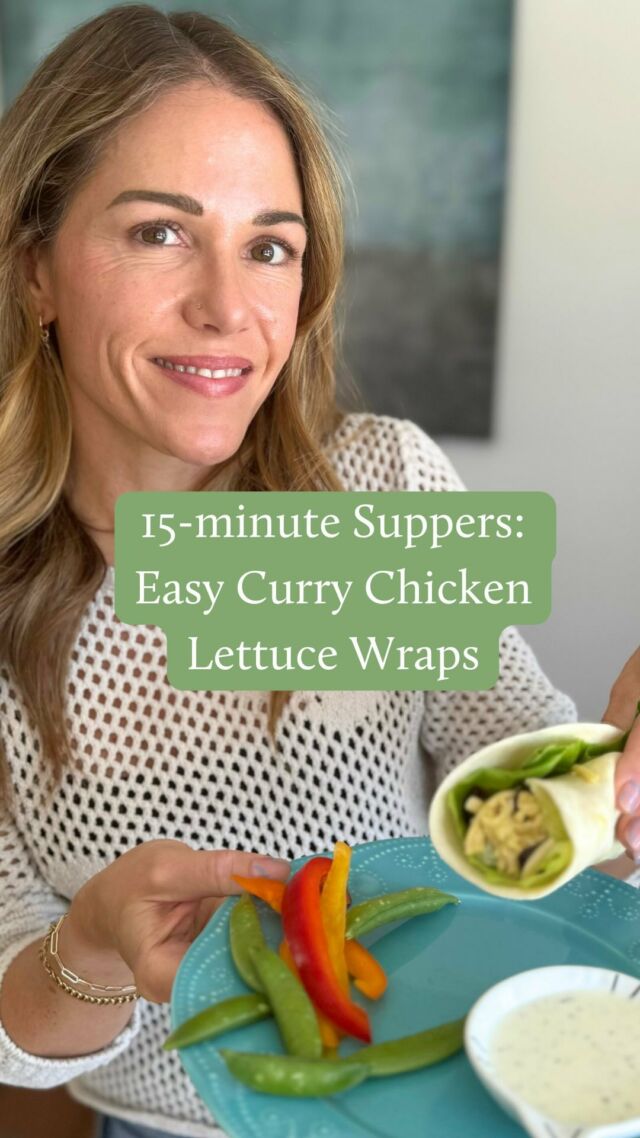
Comments
Joy Rogers says
A friend of mine has a grandchild aged 2 who can out eat everyone, whether the food is spicy, different, etc.. for instance, if there were 10 meatballs only on he table, he Can and will eat all of them. He is thin, not heavy at all. Very small bones, not big boned. He goes a mile a minute all day. When he smalls anything cooking, he will run to the table, climb up on a chair and yell, “hungry” over and over. He will not move from his seat until the food comes and he has eaten. He also eats the food off of other peoples plate if they leave anything. Thoughts?
Sarah Remmer says
Hi Joy, it sounds like he could be going through a growth spurt, and if he’s very active, his appetite could be perceived as “big”. As long as he is growing well, there shouldn’t be a concern. Where I would be concerned is if there was any food restriction happening. It also sounds like boundaries need to be set around meal timing. Without knowing a full history, it’s hard to provide specific advice. If you’d like to contact us for further investigation, please contact my team! https://www.sarahremmer.com/book-an-appointment/
Chris says
My daughter is 20 months old-33 inches and 27 pounds with a large pot belly that people continuously comment on. It’s frustrating because she can eat as much as an adult and everyone always has something to say. I try so hard and portion everything but the second she sees someone eating she wants more regardless. It’s embarrassing in public. I don’t know what to do and I feel defeated as a mother dealing with this. The other day someone told me she’s going to be a chubby kid and it made me so upset.
Sarah Remmer says
I’m so sorry, Chris. Please know you’re not alone in this. I’d recommend you reach out to my team. Without knowing your full story, it’s hard for me to provide specific recommendations. I would also highly recommend you sign up for my Mealtimes Solved course. We dive deep into weight gain and body issues for kids. https://www.sarahremmer.com/shop/
Alicia F says
My sister in law has a tendency to Overfeed my nephew. On top of his solid table foods, she is providing 4-5 formula bottles per day. My nephew is way above the height and weight healthy parameters, he is 1 year and 10 months and weighs 46 lbs.! He is wearing size 5 T, and we are concerned with this as the baby looks overweight. She had tremendous hunger issues as a child and she will not take well the well meaning advice of us in the political family. I know she should stop the formula bottles, but says he doesn’t like cow’s milk.
Sarah Remmer says
Hi Alicia, thank you so much for having the courage to share your experience here. I am sorry you are going through this. I would highly recommend you book a consultation with our team, if possible: https://www.sarahremmer.com/book-an-appointment/. We would love to help your SIL.
Caroline says
My 2.5 yo son never stops eating. I have to hide my own meals (as does everyone around him) as he will always want to eat when he sees food. He’s on the shirt side so weight is a problem (his BMI is 85% so technically considered overweight). I know I’m not supposed to restrict food but if he continues the routine of eating adult sized portions or having “2 lunches” I worry he is setting himself up for being overweight.
Sarah Remmer says
Hi Caroline, I know many parents can relate to your situation. Please know that you’re not alone. It sounds like we might need to take this conversation over to email. Please feel free to contact me here: https://www.sarahremmer.com/contact/ I’d be happy to offer advice there.